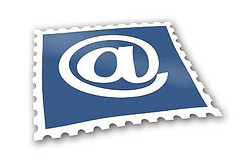This week Facebook COO Sheryl Sandberg claimed email is probably going away. This claim is more self-serving marketing fluff than a serious prediction that’s likely to be realized. However, it does point to an important shift in electronic communication: the center of gravity of personal communication has shifted away from email and instant messaging to social media and text messaging. The providers of email and IM including Yahoo, Google and AOL will be hurt by this shift as users pay less attention to the older mediums. However, email is not going to disappear anytime soon.
The primary shift is in personal communication. Status updates substitute for emails or IMs. Picture sharing is easier and more satisfying by Facebook than by email. The broadcast nature of social media means it takes less effort to keep friends and family up to date. And even when person-to-person communication is desired, the context rich nature of the social media means a Facebook message is often preferable to an email. Some of the best evidence of the size impact is Neilsen’s recent study in the UK showing that instant messaging has has dropped from 14% to 5% of internet usage time.
Email is not going to disappear though. Email is an asynchronous messaging medium thats private, addressable to a particular person and ubiquitous. Such a medium provides enough value that it won’t disappear without one with similar properties taking its place. EMail is needed for notifications for everything from my credit card bill is ready to there’s a sale at my favorite retailer. Conceivably these could move to another mechanism with similar properties like Facebook message but then my Facebook inbox would be just overflowing as my email inbox. Today, part of the value of social media messages for person-to-person communication is that the channel is free of spam and relatively uncrowded. If Facebook opens up it’s messaging to these business-to-consumer communications, it becomes just another crowded channel and while I may care what my friends are up, I really care very little about what bank did today so the inherent advantages of the social mediums no longer matter.
The other reason that email won’t disappear is that there’s no viable substitute for business communication. An email replacement for business communication requires both ubiquity so anyone can talk to anyone and the ability to keep the communication within an organization both private and secure. There’s nothing on the horizon that meets these requirements. Google Wave is a contender but the slow adoption thus far is an strong indicator that it’s going to be really hard to get people change their established behavior. Additionally, Google Wave’s complexity is hindering its diffusion outside of the earliest adopters.
Sandberg’s thesis is what teens do today is predictive of the future and since only 11% of teens check email daily, email is going to disappear. The flaw in this argument is that teens don’t have the needs that drive email usage. They don’t need to get notifications from their bank or cable or cable company that their bill is ready. They have no business communication needs. They only communicate person-to-person or person to small group and that’s the area wher the shift away from email has happened.
A big impact of the center of gravity shifting will be on marketers who have been effectively utilizing email. Without personal communication, the value of email to users is lower since it’s now all notifications or stuff that only might be interesting. Lower value means less of the mental attention that email marketers and advertisers on email services need to connect with audiences. It’s akin to the difference between scanning the news headlines to see if there is anything of interest and reading an article in depth. There’s less mental engagement and less time spent on a scan.
The long run solution for marketers will be the same one Sanberg advocates which is add social media to the marketing mix. But there won’t be a dramatic death of email, at least until there is something it supersede for notifications and business communication. The teens of today will start using email when grow up an have the need for it.

